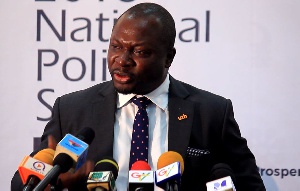 CEO of Ghana Association of Banks, John Awuah
CEO of Ghana Association of Banks, John Awuah
John Awuah, Chief Executive Officer (CEO) of the Ghana Association of Banks (GAB), has said changes in the international trade finance sector requires local banks to build capacity of their employees.
He said bridging the knowledge gap in the area would help banks take advantage of opportunities and deal with emerging threats in the sector, especially at a time when the African Continental Free Trade Agreement (AfCFTA) was operatipnal.
“It is an ongoing thing. Everyday new things are coming up, new issues are emerging particularly in the areas of trade-based money laundering activities which goes through the international trade process… when you hear AfCFTA, you must pair it with trade finance,” he said.
He said this during an interview at the closing ceremony of a four-day trade seminar involving 60 bankers from six countries in West Africa.
The event, organised by Ghana International Bank (GHIB), a Ghanaian owned bank incorporated in the United Kingdom (UK), was aimed at building capacity of participants in correspondent and corporate banking, treasury, transactional banking services and international trade finance.
Mr Baafuor Ohene Abankwa, the Country Representative of GHIB, said trade financing provided banks and financial institutions with huge opportunities to be the panaceas for the movement of goods and services on the continent.
That, he said, could be done through the provision of easy payment options and financing for business expansion.
“Here in Ghana, there are several commodities that we have that are absolutely required in the rest of Africa and it is important that banks and financial institutions begin to facilitate that,” he said.
Speaking on the impact of AfCFTA, he said the agreement had inspired the Bank to see how best it could position itself to support businesses under the trade programme.
He added: “Yes, the free trade agreement is very interesting development for us, we have been in discussion with the entity driving that and a lot of banks across the continent have seen the benefits of the programme and we are eager to see how we can help to see the success of the programme.’’
He expressed the willingness of the Bank to continuously collaborate with local banks to facilitate the import and export of goods and remittance flows with the growing the economy.
He described the decision to incorporate the Bank abroad as “a visionary move to ensure that we have a Ghanaian face in the western world”.